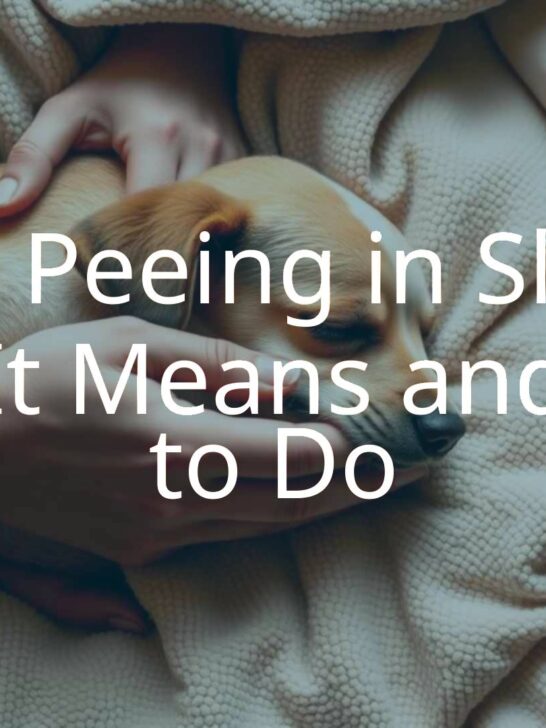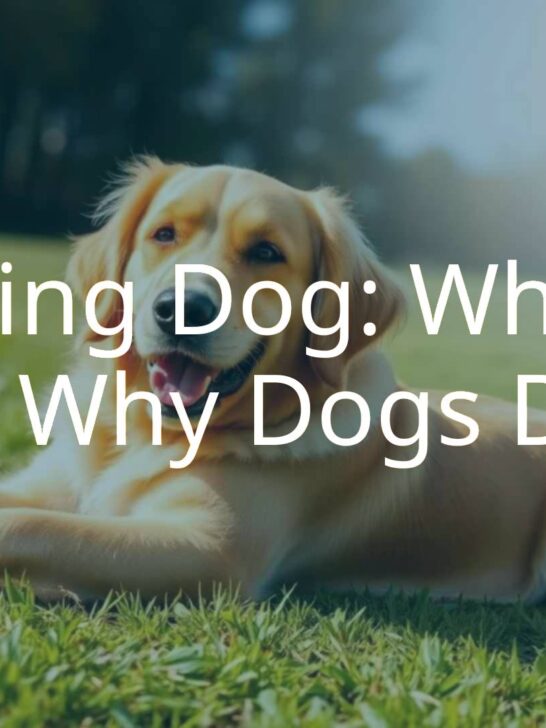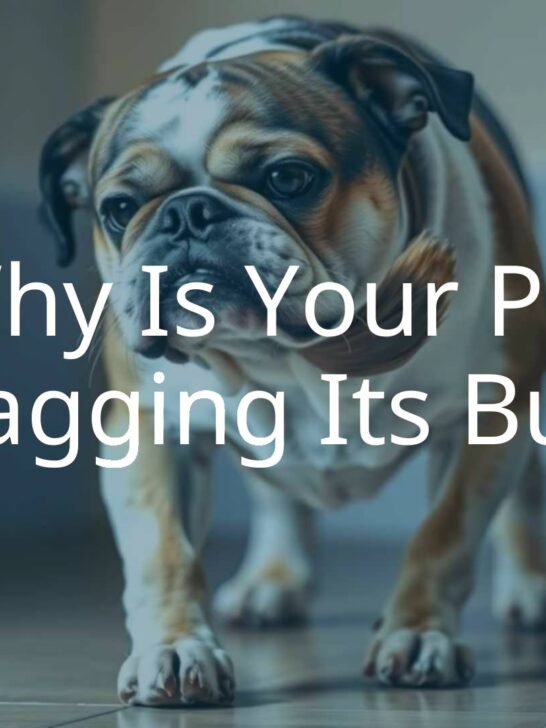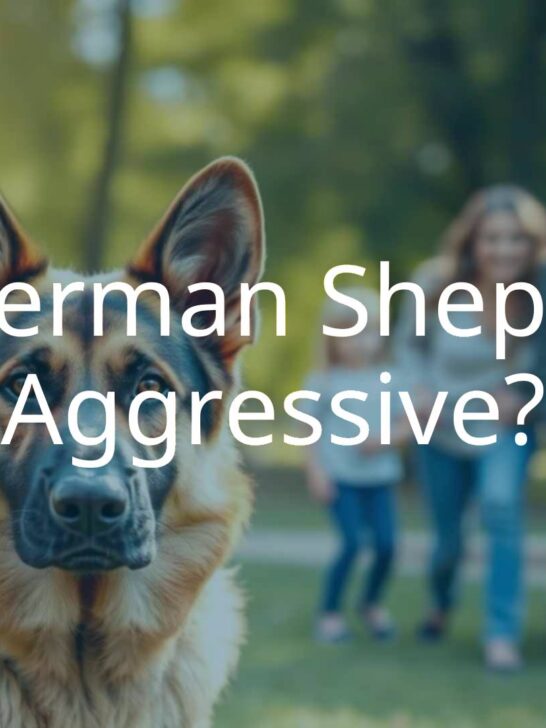Will My German Shepherd Protect Me Without Training? The Family Guardian
You cannot teach old dogs new tricks – Joseph Chamberlain
The working dog with a heart of gold, the Deutscher Schaferhund, or as it’s more commonly known the German Shepherd, is one of the most instantly recognizable canines in the world.
Prized by the Police and Military for their intelligence and willingness to learn and adapt to new roles, the German Shepherd is a self-assured working dog whose determined and fastidious nature is a trait that its owners and handlers value in this forthright and loyal companion and colleague.
The breed’s aforementioned loyalty means that as soon as they’re introduced to, and become part of a family, they’ll do anything that they can to protect their new “pack”. You don’t need to train your German Shepherd to protect you and keep you safe, it’s an instinctive behavior that’s part and parcel of its genetic make-up.
He’ll lay down his life without a second thought to defend you and your family from any, and all perceived threats and harm, and whether the danger the Shepherd senses is real or not, he’ll react immediately and instantly.
In order to understand why the Shepherd reacts the way he does, why his first instinct is to leap headlong into the fray and defend those he lives with, we’re going to look at the history and temperament of the German Shepherd to paint a broader and more fully rounded portrait of the breed.
Along the way, we’ll also look at the ways in which your Shepherd will step up to the plate for you, and how you can help him to control his instincts, so that he’ll only react when you want, and need him to.

Are German Shepherds Protective? Breed History
To fully understand and appreciate why German Shepherds are so protective and behave the way they do, it’s important to know their history, where they came from, and what they were bred to do. Their past holds the key to their present, and the more you know about a Shepherd, the easier it’ll be for you to relate to your dog and to be able to predict and know when, where and how he’ll react to any given situation.
The German Shepherd is, contrary to what you might have been led to believe, a relatively recent addition to the canine kingdom. While the first recognized German Shepherd, Horand Von Grafrath was registered by the founder of the Verein für Deutsche Schäferhunde (Society for German Shepherd Dogs), Max Emil Freidrich von Stephanitz in 1899, it’s unlikely that he was the very first German Shepherd.
Even though Horand is acknowledged as being the genetic model that all modern Shepherds are derived from, he was the product of a selective breeding program designed to create a better herding dog that began somewhere around 1859.
Originally bred to be herding dogs, the German Shepherd’s instinct to protect his family can be traced back to the formative years of the breed, when they were purposely created to be better at handling, commanding, and protecting large flocks of sheep.
For modern Shepherds, their family becomes their pack, and their flock and their innate need to protect those in their charge take command in almost every social situation, and they will take charge and willingly step into harm’s way if they think the wellbeing and safety of their pack are being threatened in any way.
The Shepherd’s Temperament
As well as a familiarity with the history of the breed, which highlights where their protective instincts comes from, a general overview of the behavioral traits and characteristics of a German Shepherd can help you to further understand why your dog behaves the way he does, and why sometimes he can appear to be prone to outbursts of aggression around, and in the company of, strangers.
Like all herding and working dogs, German Shepherds are naturally intelligent and are ranked by Stanley Coren (the world’s foremost expert in canine psychology and mental ability and acuity) as being the second most intelligent breed in the world. Coupled with the breed’s desire and willingness to learn and have some sort of defined role, their intelligence makes them ideal for police and military work.
Curious and friendly, the Shepherd is noted for its fierce loyalty to those it is closest to, and this devotion further fuels their protective instinct. It isn’t uncommon for them to become incredibly overprotective and to react to the slightest stimulation, which while seeming harmless on the surface can be problematic in social situations, especially when you’re walking or out with your dog, and the likelihood of encountering other dogs and strangers is exponentially increased.
Home Is Where The German Shepherd’s Heart Is
Shepherds are also territorial, and for them, home is where the heart is, and their hearts belong solely to their families. This means that they can become defensive of your home, which again can be problematic if you have a lot of visitors, as the breed is notoriously wary of any person that they consider to be a stranger.
Again, this can be problematic if you’re used to entertaining friends and colleagues and needs to be addressed if your dog starts to show any hint of aggression toward anyone who visits your home.
While it might seem as though we’ve painted an unflattering portrait of the breed so far, in reality, the Shepherd is a fun-loving, affectionate dog who enjoys nothing more than spending time with his pack. It is however important to acknowledge and accept the breed’s slightly less positive behavioral traits and instincts so that you can help them to control them and minimize the chances that they could be a danger to your dog, and others.
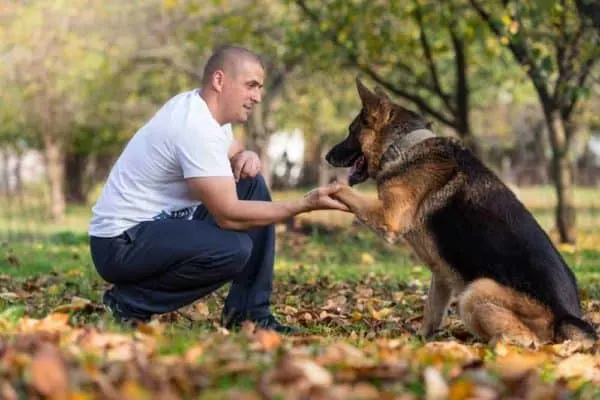
The Dangerous Dog Myth
It’s time to debunk this fallacy once and for all. German Shepherds aren’t any more dangerous than any other breed of dog. In fact, they’re ranked as the thirty-eighth most dangerous breed in the world, which means that there are thirty-seven other breeds of dog who are more likely to bite you than a German Shepherd is. So where did the idea that a German Shepherd is a dangerous dog come from?
The myth, here in America at least, has a threefold origin, the first of which dates back to the nineteen twenties and early nineteen-thirties. German Shepherds were popular pets of choice with gangsters and criminals, probably due to their protective instinct, which meant that the breed became associated with organized crime during its heyday, and that image burned itself into the mainstream zeitgeist, and once it was in place, it became almost impossible to shift and negate.
The second is their chosen “career” path in the military and the police. The populist belief is that Shepherd’s suitability for both roles is determined by the breed’s aggression, which leads people to believe that they’re dangerous. This simply isn’t true, as the reasons why most police and armed forces choose German Shepherd’s are because the breed is intelligent, obedient, and has a desire to please its owner or handler.
All of these facets make them easy to train and work with, which are the real reasons why German Shepherds are selected for those roles.
And the final reason why Shepherds are often viewed as being dangerous dogs is their innate desire to protect their owners and families.
This behavior is viewed simply as aggression by outsiders or people unaware of the way in which the dog is genetically predisposed to react to any stimuli they regard as being threatening, and that ill-educated and uninformed “opinion” (because let’s face it, that’s what it is, opinion and not fact) has helped to perpetuate the myth that German Shepherd’s are unduly dangerous when that simply isn’t true.
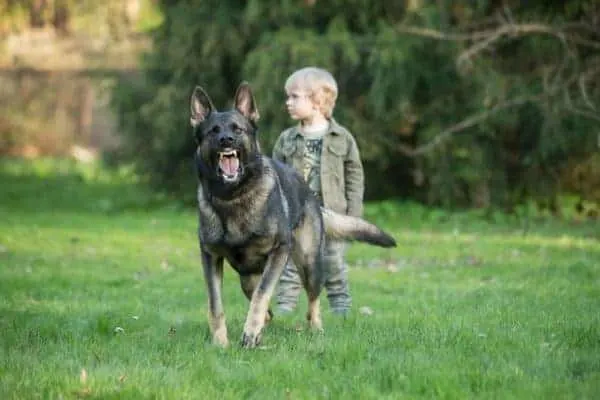
How Will My German Shepherd Protect Me?
If you’re expecting your Shepherd to leap at any potential threat with its fangs bared and start biting and fighting all and sundry whenever it thinks that you’re in danger, it might be time to reevaluate how you assume your dog is going to behave, as that’s always the dog’s last resort (unless he’s commanded to do so). There are a number of default defensive behaviors that he’ll engage in before he even thinks about using his teeth.
Barking And Growling: The initial defensive position that a German Shepherd will assume is the same as almost every dog does. They’ll start growling and barking at the perceived threat. While a growl is a direct warning that tells the recipient to back away and leave your dog and you alone, barking has a much more generalized nature.
When any dog starts barking, it’s his way of communicating what’s happening around him to you and the rest of the world. When a German Shepherd starts barking in any situation in which they feel threatened or think might be dangerous, that bark is aimed at warning you about the threat and attempting to scare off or frighten the target the bark is aimed at.
Hackles Up, Teeth Bared: Your Shepherd’s body language is an immediate giveaway that they think that something, somewhere around you is posing some sort of threat. If your dog’s hackles (the hair on the back of a dog’s neck and between his shoulder blades) stand up, he begins baring his teeth and looks like he’s poised for action and ready to hurl himself at whatever he thinks the problem is, he’s warning you, and anyone around you, that’s he’s ready to handle things his way if he needs to.
Anxiety and Closeness: If your dog moves in close, and basically plants himself next to your legs while you’re walking or sits with his back pressed against you while you’re at home, he’s making the world aware of the fact that he’s your dog and that he’s ready to stand with you come what may.
And if he starts to fret, whine and pace backward and forwards, it’s his way of warning you that he thinks or senses danger, and wants you to be aware of that fact that he thinks trouble might be about to pay both of you a visit.
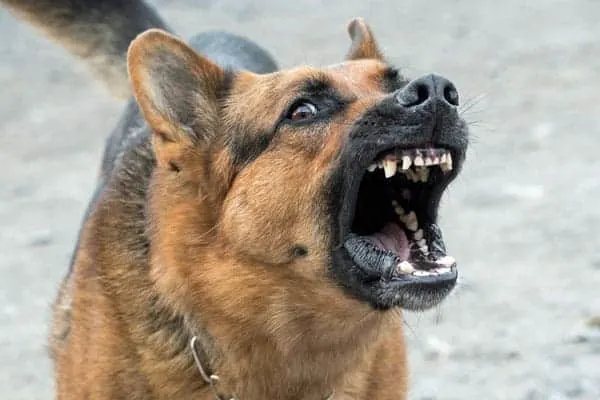
Curbing The Shepherds Instincts
While you’ll never need to feel intimidated or scared in your Shepherd’s company and that, and having owned Shepherd’s for years we’re more than familiar with this feeling, it’s also heartwarming and more than a little overwhelming knowing that your dog will do whatever he can to protect you and your family.
Sometimes though, you’ll need to rein his protective instinct in, as he doesn’t always know when it’s appropriate and when it isn’t appropriate to flex his, not inconsiderable muscle, on your behalf. And there are a number of ways that you can help your Shepherd to do this, and only react when it’s absolutely necessary.
Training: German Shepherd’s are naturally intelligent and obedient dogs, and react well to training. By teaching your dog basic commands and to listen to your voice and obey you without second-guessing you, you’ll be able to fully control the situation if he overreacts to any stimuli. The calming reassurance of your voice will make him aware that there’s nothing to worry about, and he’ll calm down immediately. If you’re worried about your boy’s aggression toward other dogs and people, find a training class and enroll him in it as soon as you can.
Socialization: The majority of the threats that your Shepherd will react to are more than likely going to be directly related to other dogs and people. It’s important to make sure that your Shepherd is taught that other dogs and people aren’t always a threat and the easiest ways to do this is by enrolling him in a socialization class that will gradually introduce him to other dogs and encourages him to socialize with them, and for you to gently introduce him to as many people as you possibly can.
As German Shepherd’s are also notoriously territorial and defensive of their homes, whenever someone visits, they should be gently introduced to your dog so that he’ll be aware that strangers aren’t always dangerous, and that they can enter his home and not be a threat to his family.
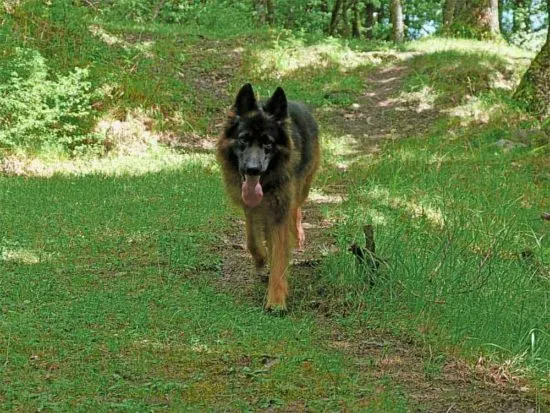
The Final Shepherd Verdict
Don’t be afraid of, or worry about your German Shepherd’s protective instinct, as he’s only doing what comes naturally to him, and if anything his devotion and loyalty to you, and his family should be cherished.
But just because you cherish something, it doesn’t mean that you shouldn’t do your utmost to preserve and protect it, and the best way to help your Shepherd curb and control his instincts is by training him and letting him know that the world isn’t as scary or dangerous as he thinks it is.















